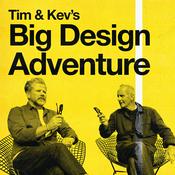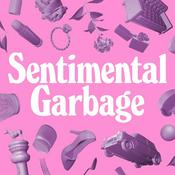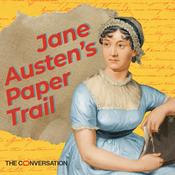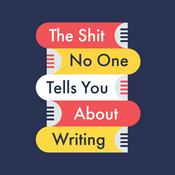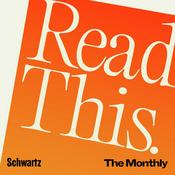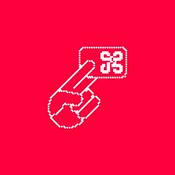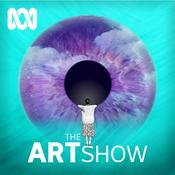Available Episodes
5 of 221
- 2025 Holiday Gift GuideIt’s that time of year again—our favorite episode to put together. A moment to look back at the objects, experiences, and ideas that sparked creativity for us this year. From books that moved us to tools that surprised us to experiences we can’t stop recommending, we’ve gathered a set of gift ideas for the designers, makers, and curious people in your life (including you). We’re starting with budget-friendly picks and moving up from there, so whether you’re filling a stocking or going big, you’ll find something here. Let’s get into it. *** Before we get to the list, if you’re looking to give (or get) the gift of education, for the next week only you can get or gift a year of premium for 25% off, our only sale of the year. Buying a year-long subscription will get you to our ever-expanding Design Better Toolkit (with over $2K in discounts on tools and courses), as well as monthly AMAs, ad-free episodes, and our library of books. Doing this also supports anyone who can’t afford a subscription through our scholarship program. 25% off a year, expires in 1 week *** Find the full gift list on our Substack: https://designbetterpodcast.com/p/2025-holiday-gift-guide--------44:41
- Phil Gilbert: Making a 114-year-old, 400,000 person company care about designChanging the culture of a 400,000-person company isn’t just hard—it’s the kind of transformation most leaders wouldn’t even attempt. But when Phil Gilbert joined IBM as General Manager of Design in 2010, that’s exactly what he set out to do. And remarkably, he had a lot of success. Visit our Substack for bonus content and more: https://designbetterpodcast.com/p/phil-gilbert Phil led one of the most ambitious design transformations in corporate history, hiring over 1,000 designers, creating IBM’s design thinking framework, and embedding a new way of working across nearly 180 countries. Now, with his new book Irresistible Change, Phil is sharing the blueprint for how he did it—and more importantly, how you can apply these lessons to your own organization. In this episode, we talk with Phil about treating change like a high-stakes product, why IBM’s transformation was opt-in rather than top-down, and what it takes to win over engineers who’ve spent decades deeply entrenched in a technical worldview. We also explore the design thinking bootcamp that became legendary within IBM, the intentional design of physical studio spaces, and what happened after Phil left the company. Phil’s insights aren’t just for those leading massive organizations—they’re for anyone trying to spark meaningful change, build enthusiasm without mandates, and create work that actually matters to the people doing it. Bio Phil Gilbert is best known for leading IBM’s 21st century transformation as their General Manager of Design. After selling his third startup to IBM in 2010, Phil was asked by IBM in 2012 to use design thinking, coupled with agile, to update how IBM’s teams worked. The transformation became the subject of a Harvard Business School case study, the documentary film The Loop, and feature articles in the New York Times, Fortune Magazine, Forbes, Bloomberg, INC and many others. Phil’s 45-year career spans startups, large corporations, and board memberships, where he has led organizations ranging from solo ventures to those with 400,000 employees. In 2018 Phil was inducted into the New York Foundation for the Arts’ Hall of Fame. In 2019, the State of Oklahoma (Phil’s native state) named him an Oklahoma Creativity Ambassador for his achievements in the world of creative thinking and innovation. Phil left full-time operational responsibilities at IBM in 2022 in order to focus on helping the next generation of entrepreneurs, business, and military leaders understand how to impact culture at scale, to improve innovation and team performance. Phil lives in Austin, Texas. *** Premium Episodes on Design Better This ad-supported episode is available to everyone. If you’d like to hear it ad-free, upgrade to our premium subscription, where you’ll get an additional 2 ad-free episodes per month (4 total). Premium subscribers also get access to the documentary Design Disruptors and our growing library of books: You’ll also get access to our monthly AMAs with former guests, ad-free episodes, discounts and early access to workshops, and our monthly newsletter The Brief that compiles salient insights, quotes, readings, and creative processes uncovered in the show. And subscribers at the annual level now get access to the Design Better Toolkit, which gets you major discounts and free access to tools and courses that will help you unlock new skills, make your workflow more efficient, and take your creativity further. Upgrade to paid *** If you’re interested in sponsoring the show, please contact us at: [email protected] If you’d like to submit a guest idea, please contact us at: [email protected]--------44:09
- Cecilia Brenner: Moving beyond design theater to measurable impactWe’ve talked to many design leaders who have burned out after a decade or more of corporate work. But after 17 years at Philips designing health innovations, Cecilia Brenner wasn’t burnt out…she loved it. And she wanted to find a way to scale her sense of purpose, so she joined Design for Good as Managing Director, and found a way to work with hundreds of designers who want meaningful impact without leaving their day jobs. This is a preview of a premium episode, find the full episode on our Substack: https://designbetterpodcast.com/p/cecilia-brenner Design for Good mobilizes what Cecilia calls a “radical global action collective”—1,600 designers from companies like Philips, Lloyds Bank, and others—to tackle UN Sustainable Development Goals through focused, two-year cycles. Their first cycle addressed clean water and sanitation. Now they’re working on quality education. And here’s the twist: everything they create is open source. In our conversation, Cecilia explains how Design for Good measures real impact (not estimated future impact), why they chose to focus on one SDG at a time instead of spreading resources thin, and what it means to design for “all life,” not just human life. If you’ve ever wondered how to find more meaning in your design work—or questioned whether purpose-driven projects actually move the needle—this episode offers a surprisingly practical model. Bio Cecilia Brenner is the Managing Director of Design for Good, a global alliance dedicated to creating lasting, measurable impact for the United Nations Sustainable Development Goals (SDGs). Since joining in May 2024, Cecilia has successfully led the charity in mobilising hundreds of creatives to design in close collaboration with NGOs and affected communities worldwide. With over 25 years of international experience in design and leadership, Cecilia is a catalyst for inclusion, innovation, and impact. She previously served as an Experience Design Director & Business Partner at Philips, where she spent 17 years improving people’s health and well-being through meaningful innovation, building high-performing, engaged global design teams and communities, as well as leading transformational programmes with a unique blend of network leadership, team-building excellence, and strategic insight. *** Premium Episodes on Design Better This is a premium episode on Design Better. We release two premium episodes per month, along with two free episodes for everyone. Premium subscribers also get access to the documentary Design Disruptors and our growing library of books: You’ll also get access to our monthly AMAs with former guests, ad-free episodes, discounts and early access to workshops, and our monthly newsletter The Brief that compiles salient insights, quotes, readings, and creative processes uncovered in the show. And subscribers at the annual level now get access to the Design Better Toolkit, which gets you major discounts and free access to tools and courses that will help you unlock new skills, make your workflow more efficient, and take your creativity further. Upgrade to paid--------22:53
- Video Rewind: Jordan Mechner: Pioneering game designer on creating Prince of Persia, Karateka, and a new graphic novel memoirThis is a preview of a premium episode. You can find a video version of the full episode on our YouTube channel: https://www.youtube.com/watch?v=3dvoGPZEY1g We’ve been on the road this week, recording some in-person episodes in Portland Oregon, with Ryan Coulter—co-founder of The James Brand, and the wonderfully hilarious graphic designer Aaron Draplin. We’re excited to bring you this episodes soon, and in the meantime we’re rewinding to one of our favorite episodes this year with Prince of Persia creator Jordan Mechner. You may have heard that we’re publishing more video from our episodes, and you can now find a video version of this episode on YouTube. Enjoy! *** As a kid in the 80’s, Eli fell in love with games on computers like the Apple II, Commodore 64, and later the Amiga and Macintosh. One of the very first games he played was called Karateka, which was inspiring for the realistic movements of its digital karate antagonists, even on a black-and-green Apple II monitor. Our guest today, Jordan Mechner, created Karateka while an undergrad at Yale University in 1984, and it went on to be a commercial success. He followed it up with the game Prince of Persia (you’ll hear a clip from the soundtrack in the introduction, which Jordan’s father composed and which Jordan invented a way to transpose onto the Apple II’s tinny speakers before game soundtracks were widespread on the machine). Jordan documented the creation of the game in a wonderful published version of his diaries called The Making of Prince of Persia, and we spoke with him about how he taught himself the skills to build successful video games in a pre-internet era, why he journaled about his work process (and what it taught him), and about his new graphic novel Replay, a memoir recounting his own family story of war, exile and new beginnings. Karateka on the Apple IIPrince of Persia on the Apple II (play the Mac version online here)--------24:57
- Ben Swire: Author of "Safe Danger" on the hidden reason team building efforts failAs educators, we’ve grown wary of the term “safe spaces,” especially when what many students really need is a space to engage with “dangerous” ideas. But true dialogue doesn’t begin with risk—it starts with trust. Our guest today, Ben Swire, wrote the book Safe Danger, which offers a thoughtful, practical approach to building the psychological safety that allows curiosity, connection, and even productive disagreement to flourish. Find bonus content and more on our Substack: https://designbetterpodcast.com/p/ben-swire-former-ideo-design-lead Ben’s career took him from the buttoned-up world of financial marketing to IDEO—a shift he describes as going “from Kansas into Oz.” At IDEO, he discovered that world-class work could be fueled by something radically different than what he’d experienced everywhere else. That discovery led him to spend years exploring a deceptively simple question: How do you get people to fail but enjoy doing it? The answer became the foundation of his book and his work—a concept he calls “Safe Danger,” that sweet spot where people feel safe enough to leave safety behind, but challenged enough to grow. In this conversation, we’ll explore why team building desperately needs reclaiming, how an introvert ended up running a team building company, and why the quality of your relationships at work matters way more than you think. Get the book Bio Ben Swire is an award-winning designer and writer, and former Design Lead at IDEO. His work spans design thinking, philosophy, cinema, and psychoanalytic theory, driven by curiosity about the hidden factors that shape our lives. At IDEO, Ben created Make Believe Time, a bi-weekly creative play date where colleagues learned, created, and meaningfully connected. When interest spread beyond IDEO, Make Believe Works was born—now helping organizations from Fortune 500 companies to startups build the creative and emotional muscle memory that leads to healthy, innovative, collaborative cultures. *** New tools in the Toolkit We’ve just upgraded the Design Better Toolkit, with new tools and other perks (now worth almost $2K in total). Here’s what’s new in the Toolkit: TextExpander (a wonderful productivity tool, 6 months free) Kittl (tools and templates to support your creative process, 6 months free) Subatomic: The Complete Guide to Design Tokens (20% off) Design Better Coffee & Tea (fuel your creativity, 15% off). Some of these perks are very limited and will sell out quickly. Get the Toolkit--------50:20
More Arts podcasts
Trending Arts podcasts
About Design Better
Design Better co-hosts Eli Woolery and Aarron Walter explore the intersection of design, technology, and the creative process through conversations with guests across many creative fields, helping you hone your craft, unlock your creativity, and learn the art of collaboration.
Whether you’re design curious or a design pro, Design Better is guaranteed to inspire and inform. Vanity Fair calls Design Better, “sharp, to the point, and full of incredibly valuable information for anyone looking to better understand how to build a more innovative world.”
Podcast websiteListen to Design Better, The Book Show and many other podcasts from around the world with the radio.net app
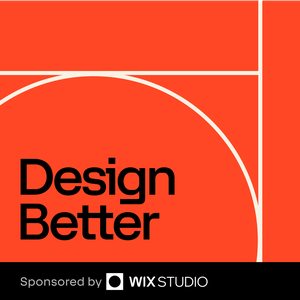
Get the free radio.net app
- Stations and podcasts to bookmark
- Stream via Wi-Fi or Bluetooth
- Supports Carplay & Android Auto
- Many other app features
Get the free radio.net app
- Stations and podcasts to bookmark
- Stream via Wi-Fi or Bluetooth
- Supports Carplay & Android Auto
- Many other app features


Design Better
Scan code,
download the app,
start listening.
download the app,
start listening.

